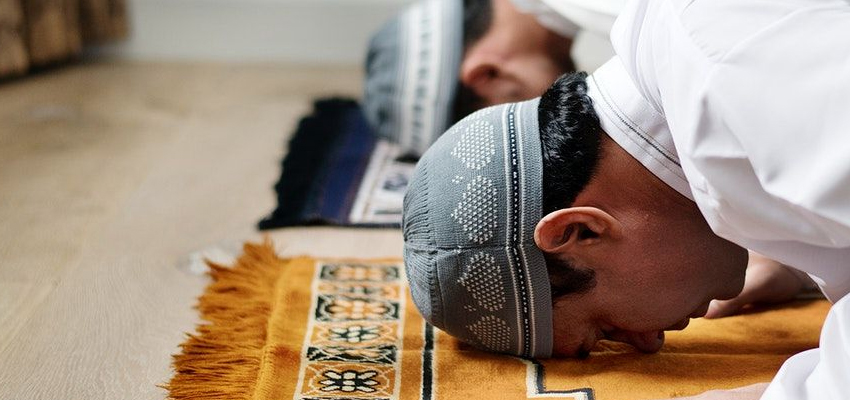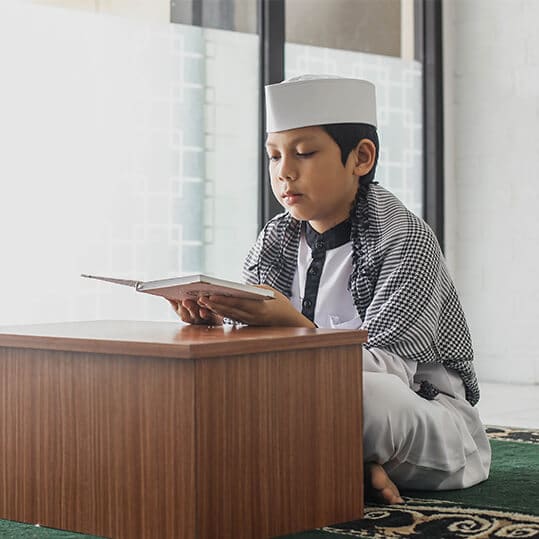
NAMAZ (Prayer)الصلاة
Q: what is Namaz ?http://onlinequran.pk/welcome/wp-content/uploads/2012/04/sa21.jpg
-
- A: Namaz is a special type of prayer that has been taught by Allah and by
- the holy prophet (peace be on him) to Allah’s bondsmen.
-
- Q: what conditions are necessary for Namaz ?
-
- A: seven are the prerequisites to Namaz , without them Namaz cannot be
- performed. These conditions are called Fard and Sharayat of Namaz.
-
- Conditions for Namaz
-
- Q: what are those seven conditions that must be observed before saying Namaz
- ?
-
- A: (1) Tahir (clean) body .
-
- (2) Tahir dress .
-
- (3) Tahir place .
-
- (4) Covering the Satr (the private parts of one’s body) .
-
- (5) The time for saying Namaz . http://onlinequran.pk/welcome/wp-content/uploads/2012/04/sa5.jpg
-
- (6) Facing towards Qibla and
-
- (7) Niyyat, or intention of saying Namaz.
-
- The first condition for Namaz
-
- Q: what is meant by Tahir (clean) body ?
-
- A: that one’s body should be clean of all Nijasat (uncleanliness).
-
- Q: how many kinds of Nijasat are there ?
-
- A: Nijasat is of two kinds. One Haqiqi , other Hukmi.
-
- Q: what is Haqiqi Nijasat ?
-
- A: the Nijasat which can be seen is called Haqiqi Nijasat, e.g., urine,http://onlinequran.pk/welcome/wp-content/uploads/2012/04/sa7d.jpg
- stool, blood, wines.
-
- Q: what is Hukmi Nijasat ?
-
- A: when a man is without Wudu , or bath (when , he needs it). He has Hukmi
- Nijasat.
-
- Q: from what type of Nijasat one should free his body before saying Namaz ?
-
- A: it is necessary to be free from both types of Nijasat for saying Namaz.
-
- Q: how many types of Hukmi Nijasat are there ?
-
- A: two types , one is the lesser type of Hukmi Nijasat which is known as
- Hadath-e-Asghar. The other is the greater type which is called
- Hadath-e-Akbar and Janabat.
-
- Q: how to clean oneself from the lesser type of Hukmi Nijasat?
-
- A: by Wudu one can clean himself from the lesser type of Hukmi Nijasat.
-
- Q: how is Namaz observed and which direction one turns his face while
- observing prayer?
-
- A: Namaz is observed by standing before Allah facing Qibla, with hands
- crossed on the belly, in the mosque or at home, reciting holy Quran,
- praising Allah’s greatness, bowing to him in respect and putting the
- forehead on the ground to show humility to him.
-
- Q. Where we should pray-in the mosque or at home?http://onlinequran.pk/welcome/wp-content/uploads/2012/04/sa11.jpg
-
- A. Allah is omnipresent (present everywhere). Whether man presents himself
- before Allah in the vicinity of a mosque or within the four walls of his
- house. You can say your prayers at home or in a mosque, Allah is everywhere.
- But there is a greater reward in observing the prayers in a mosque.
-
- Q. One has to wash his face, hands, and feet before the Namaz ; what is that
- called?
-
- A. It is called Wudu, (ablution). Namaz said without Wudu is not
- acceptable.
-
- Q. To which direction a Muslim should turn his face while offering prayer?
-
- A. Towards Makkah.
-
- Q. Why has it been ordered to turn one’s face to Makkah?
-
- A. Since it is in Makkah that the sacred house of Allah is situated. It is
- called Kaaba. One must turn one’s face towards Kaaba while offering Namaz.
-
- Q. What name do we give to the direction of our prayer?
-
- A. It is called Qibla.
-
- Q. How many times the Namaz is offered during the whole day and night?
-
- A. It is compulsory to say Namaz five times during the day and night.
-
- Q. What are the names of those five Namaz?
-
- A. 1. The first that is said before the sunrise is called Fajr.http://onlinequran.pk/welcome/wp-content/uploads/2012/04/sa12.jpg
-
- 2. The second offered in the afternoon is called Zuhr.
-
- 3. Third said nearly two hours or so before sunset is ‘Asr.
-
- 4. The fourth, said just after sunset, is Maghrib.
-
- 5. The fifth, said one and a half or two hours after sunset, is called
- ‘Isha.
Thank you for supporting our cause! Your donation helps us make a difference.

Study the Quran online with proper Tajweed recitation under the guidance of our experienced professional tutors. With years of expertise, our qualified Quran teachers are well-equipped to help both children and adults learn Quran online effectively and confidently.
Learn with a Quran tutor on Skype
Worldwide support
24 hours availability
Laptop, Smartphone Support
High-Speed Internet
Read Quran in 3 months only
Learn at Your Preferred Time
One to One Interactive Quran Teaching Classes!
Quality Control Department
Teaching Basic Islam to kids is one of the most important responsibilities of Muslim parents. When children learn Islamic valu ...
Learning Quran translation is an essential step for anyone who wants to understand the true message of the Holy Quran. While reciting ...
Learning Noorani Qaida is the first and most essential step for children and beginners who want to read the Quran correctly. Noorani Q ...
An Online Ijazah Course is a highly sought-after program for students and scholars who wish to gain formal authorization to teach the Q ...
Learning the Holy Quran with Tajweed is one of the most important responsibilities of every Muslim. Tajweed refers to correct ...
Quran memorization, also known as Hifz of the Quran, is one of the most virtuous and rewarding acts in Islam. Memorizing the Quran ...
Start your 3 days Free Trial Classes right now
© 2026 www.onlinequran.pk All Rights Reserved.
Design & Develop by website developer in lahore